Zoom
Trash

Scottish Bank Notes. Banknote History - The Committee of Scottish Bankers (CSCB) Early Scottish banknotes The first Scottish bank to issue banknotes was Bank of Scotland.
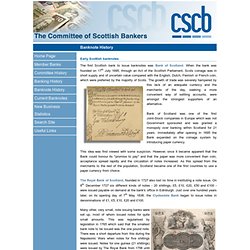
When the bank was founded on 17th July 1695, through an Act of the Scottish Parliament, Scots coinage was in short supply and of uncertain value compared with the English, Dutch, Flemish or French coin, which were preferred by the majority of Scots. The growth of trade was severely hampered by this lack of an adequate currency and the merchants of the day, seeking a more convenient way of settling accounts, were amongst the strongest supporters of an alternative. Bank of Scotland was one of the first Joint-Stock companies in Europe which was not Government sponsored and was granted a monopoly over banking within Scotland for 21 years.
This idea was first viewed with some suspicion. The Royal Bank of Scotland, founded in 1727 also lost no time in instituting a note issue. Many other, very small, note issuing banks were set up, most of whom issued notes for quite small amounts. . £1 notes arose in 1826. Bank of Scotland. In June 2006, the HBOS Group Reorganisation Act 2006 was passed by the Parliament of the United Kingdom, allowing the bank's structure to be simplified.
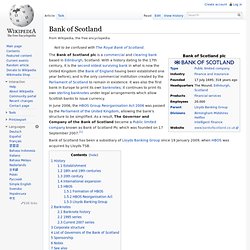
As a result, The Governor and Company of the Bank of Scotland became a Public limited company known as Bank of Scotland Plc which was founded on 17 September 2007.[1] Bank of Scotland has been a subsidiary of Lloyds Banking Group since 19 January 2009, when HBOS was acquired by Lloyds TSB. History[edit] Establishment[edit] 18th and 19th centuries[edit] 20th century[edit] Bank of Scotland - Online personal banking - Banking services. Museum on the Mound - Edinburgh Scotland. Current Banknotes : Bank of Scotland - The Committee of Scottish Bankers (CSCB) The Royal Bank of Scotland. History[edit] Foundation[edit]
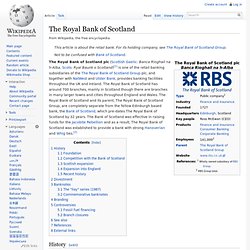
RBS Personal Banking - Mortgages, Bank Accounts, savings & more. Current Banknotes : Royal Bank of Scotland - The Committee of Scottish Bankers (CSCB) Clydesdale Bank. Clydesdale Bank, Castle Douglas Clydesdale Bank is a commercial bank in Scotland.
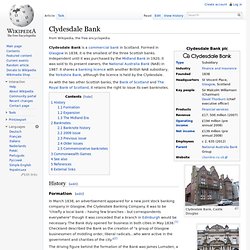
Formed in Glasgow in 1838, it is the smallest of the three Scottish banks. Independent until it was purchased by the Midland Bank in 1920, it was sold to its present owners, the National Australia Bank (NAB) in 1987. It shares a banking licence with another British NAB subsidiary, the Yorkshire Bank, although the licence is held by the Clydesdale. Clydesdale Bank: Personal Banking, Business Banking, Private Banking, from a bank you can trust. Current Banknotes : Clydesdale Bank - The Committee of Scottish Bankers (CSCB) Clydesdale Bank currently has two series of banknotes in circulation: the World Heritage Series and the Famous Scots Series.
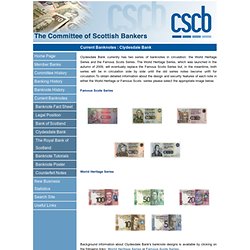
The World Heritage Series, which was launched in the autumn of 2009, will eventually replace the Famous Scots Series but, in the meantime, both series will be in circulation side by side until the old series notes become unfit for circulation.To obtain detailed information about the design and security features of each note in either the World Heritage or Famous Scots series please select the appropriate image below. Famous Scots Series World Heritage Series Background information about Clydesdale Bank's banknote designs is available by clicking on the following links: World Heritage Series or Famous Scots Series. Contact details: If you require advice on any matter relating to Clydesdale Bank banknotes please contact them, either by email at cash.services.glasgow@eu.nabgroup.com or by telephone on 0141 242 3091/2. A third of Britons think they cannot use Scottish notes in England. Scottish Bank Notes – The Treasury's toothless threat.
Friday, 13 January 2012 13:31 By John Miller.
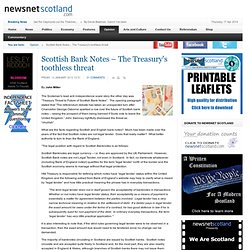
Boris Johnson intervenes over Scottish bank notes on London buses. 8 August 2012Last updated at 06:56 ET Three Scottish banks have reserved the right to print their own notes London Mayor Boris Johnson has instructed the city's buses to accept Scottish bank notes.
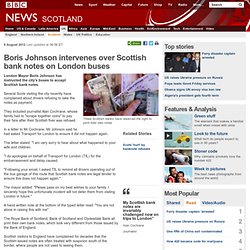
Several Scots visiting the city recently have complained about drivers refusing to take the notes as payment. They included journalist Alan Cochrane, whose family had to "scrape together coins" to pay their fare after their Scottish fiver was refused. In a letter to Mr Cochrane, Mr Johnson said he had asked Transport for London to ensure it did not happen again. The letter stated: "I am very sorry to hear about what happened to your wife and children. "I do apologise on behalf of Transport for London (TfL) for the embarrassment and delay caused. "Following your email, I asked TfL to remind all drivers operating out of the bus garage of this route that Scottish bank notes are legal tender to ensure this does not happen again. " The mayor added: "Please pass on my best wishes to your family. Can I spend Scottish money in England? Yes, you can – but it doesn't legally have to be accepted.

Three banks in Scotland are authorised to issue notes: Bank of Scotland, Clydesdale Bank and Royal Bank of Scotland. There are also four note-issuing banks in Northern Ireland: Bank of Ireland; AIB Group (which trades as First Trust Bank in Northern Ireland), Northern Bank and Ulster Bank. Banknotes issued by all seven are legal currency and can be accepted throughout the UK. But it doesn't necessarily mean they will be. The Association of Commercial Banknote Issuers states: "The term 'legal tender' has very little practical meaning as far as ordinary, everyday transactions are concerned, and it has no bearing on the acceptability of authorised banknotes as a means of payment …" Crucially, it adds: "The acceptability of any means of payment, including banknotes, is essentially a matter for agreement between the parties involved.
" British Banknotes: British Paper Money price list - Scotland.